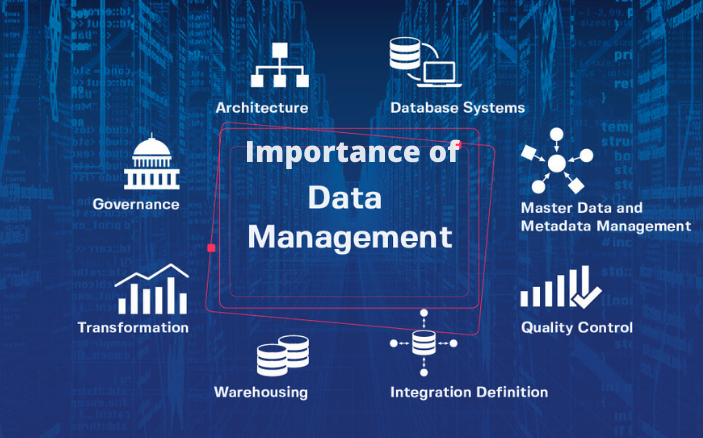Why is data management important in business? This question captures the essence of modern business practices, where data is a critical asset for organizations.
The relevance of data management is underscored by its role in enhancing business operations, boosting profits, and improving customer satisfaction.
Businesses today leverage big data analytics to explore new opportunities, make informed decisions, and gain competitive advantages.
This trend is evidenced by the growing adoption of big data technologies across various industries, as they recognize the potential of data to transform their operations and decision-making processes.
For instance, IBM’s use of AI in its “transformational leadership development” process is a testament to the power of data management.
By integrating assessment tools with AI, IBM has created a dynamic platform for training and developing candidates based on a comprehensive understanding of their strengths, weaknesses, and behaviors.
This approach enhances employee development and contributes to the organization’s overall performance.
Furthermore, advanced analytics in recruitment, promotions, and marketing strategies exemplify the increasing reliance on data for strategic business decisions.
Data management tools enable organizations to streamline processes, identify talent more effectively, and design targeted marketing campaigns.
This results in improved efficiency, better decision-making, and a stronger competitive position in the market.
As an additional reference, you can observe how TechTarget explains the fundamentals of data management.
In the meantime, we will focus on the benefits of data management for your business in this article.
What is The Purpose and Use of A Data Management System?
Each aspect below underscores data management’s increasing importance and benefits in the modern business environment.
1. Decision-Making Accuracy: The Bedrock of Strategic Planning
Effective data management ensures that the information used in decision-making processes is accurate and reliable.
This is crucial because decision-making in business is often complex and based on numerous variables.
When the data is precise, it reduces the risk of errors and misjudgments, leading to more confident and successful decision outcomes.
Precise data has a direct impact on strategic planning. It enables businesses to analyze trends, predict future outcomes, and make informed choices about where to allocate resources.
When decision-makers can access high-quality data, they can identify opportunities and challenges more effectively and devise strategies aligned with the company’s goals and market realities.
Accurate data forms the foundation of strategic planning, guiding businesses toward informed decisions and aligned with long-term success.
This clarity and foresight are essential in today’s fast-paced, data-driven business environment.
2. Data-Driven Insights: Fueling Innovation and Optimization
Data-driven insights are critical in driving innovation and optimizing operational processes in businesses.
Effective data management is integral in extracting these valuable insights from business data.
A 2022 case study from CAMELOT Management Consultants demonstrates this impact in a real-world scenario.
The study showcases how a holistic approach to data management, encompassing cultural, organizational, and process-related aspects, can transform a company into a data-driven organization.
This transformation enables your company to support new business models, build a solid foundation for data-driven decision-making, and drive innovation.
That’s why Nexalab’s data visualization and ETL services play a strategic role in this area.
We extract, transform, and load your data from various sources, ensuring its accuracy and relevance through cleaning, validating, and enriching processes.
The transformed data is presented as visually engaging and actionable insights, aiding your businesses in making informed decisions, identifying trends, and efficiently communicating data.
3. Regulatory Compliance
Regulatory compliance is crucial to data management, particularly in safeguarding businesses from legal issues and potential penalties.
One of the most significant examples is the General Data Protection Regulation (GDPR), which sets forth privacy standards for storing user or customer details online in the European Union.
Another key aspect of regulatory compliance in data management involves understanding different industries’ specific needs and risks.
For instance, the 2023 Thales Data Threat Report explores the challenges and strategies for protecting financial assets and sensitive data in the financial services sector.
This report underscores the importance of adhering to regulatory compliance standards to protect organizations from data breaches and ensure that data management practices align with industry-specific requirements.
These examples highlight the imperative role of robust data management systems in ensuring adherence to data protection regulations and industry standards.
4. Customer Relationship Management: Personalization for Satisfaction
By strategically utilizing customer data, your business can provide personalized customer relationship management (CRM), greatly enhancing customer satisfaction and loyalty.
The 2020 McKinsey case study shows how Sephora, an international retailer of beauty products, successfully implemented CRM personalization.
The Sephora omnichannel approach to personalization includes a mobile app that allows customers to book in-store makeovers, try on products virtually, and receive product recommendations based on personal beauty traits.
Sephora’s approach to CRM personalization includes integrating customer data across all channels, offering tailored recommendations, and providing value to customers through its tiered loyalty program.
This strategy has resulted in a significant increase in customer engagement and sales.
The Sephora CRM examples underscore the importance of effective data management in personalizing customer experiences.
By utilizing customer data, your business can improve customer relationship strategies and drive significant improvements in customer loyalty and business performance.
5. Operational Efficiency: Streamlining Business Operations
Organized and well-managed data contribute significantly to streamlining business operations, impacting efficiency, resource allocation, and overall productivity.
For example, the state of Washington implemented performance management and employee-driven process improvement strategies, leading to notable achievements in operational efficiency.
The Results Washington initiative launched in 2013, aimed to align government activities with top-priority statewide goals, applying Lean thinking and tools to improve processes.
The initiative included performance tracking on a public dashboard and Lean process improvements, resulting in significant cost savings and improved customer satisfaction.
The state saved millions of dollars and countless hours through streamlined processes, demonstrating the impact of effective data management on operational efficiency.
The example underlines data management’s importance in improving operational processes, ultimately increasing organizational efficiency and productivity.
6. Risk Mitigation: Safeguarding Against Threats
Risk mitigation is a crucial aspect of data management systems, particularly due to the risks associated with inadequate data management, such as data breaches and loss.
A proactive approach to data management is essential for mitigating these risks and ensuring the security of sensitive information.
Effective data management involves identifying and assessing an organization’s vulnerabilities and potential risks.
Understanding the amount and type of sensitive data the organization holds is crucial to determining what data needs protection and how.
Implementing risk management strategies, such as cybersecurity risk assessments and Data Protection Impact Assessments (DPIAs), can help identify potential risks and understand an organization’s risk level.
A well-managed data system reduces the risks associated with data breaches and loss while ensuring the security and integrity of sensitive information.
Proactive data management enhances an organization’s security, operational efficiency, and success.

7. Data Security: Fortifying Against Threats
Data security is critical to a data management system, focusing on safeguarding sensitive business information.
Advanced data security measures are essential in providing comprehensive protection against various threats.
Encryption is one of the key security measures. It involves converting data into a cipher to secure it from unauthorized access during storage or transmission.
Access controls are another crucial security measure, limiting unwanted access to sensitive information.
Implementing access control mechanisms ensures that the least privileges are assigned to users.
Techniques like multi-factor authentication (MFA) and Single Sign-on (SSO) can protect databases even when login credentials are compromised.
Regular auditing and monitoring are vital for maintaining data security. These practices provide a proactive approach, allowing organizations to detect and respond to potential security breaches in real time.
Continuous monitoring of user access permissions and authentication protocols and regular audits of systems, processes, and access logs help evaluate compliance with data security policies.
8. Cost Savings: Efficiency in Resource Allocation
Efficient data management leads to cost savings in several ways, helping businesses avoid redundancies, optimize storage, and reduce errors related to data handling, ultimately leading to financial benefits.
These measures reduce operational costs and enhance overall business efficiency and effectiveness.
For example, targeted improvements in data sourcing, architecture, governance, and consumption can help companies reduce waste and manual effort, cutting annual data spend by 5 to 15 percent in the short term.
Companies can achieve even greater savings in the long term by automating core processes and integrating advanced technologies.
Master Data Management (MDM) is another effective tool for achieving cost savings.
MDM helps improve data accuracy and reduce errors, which can be costly for businesses, leading to wasted resources and incorrect decision-making.
MDM streamlines operations by reducing manual data entry, which is time-consuming and prone to errors. This results in more efficient operations, reduced labor costs, and a faster time to market.
9. Competitive Advantage: Data-Driven Excellence
Data-driven excellence provides businesses with a significant competitive edge.
By leveraging data, your business can identify trends, predict market changes, optimize operations, and personalize customer experiences.
Data-driven decision-making allows your business to outperform the competition by providing insights that lead to more effective strategies and better resource allocation.
This approach helps your business identify new opportunities, improve products and services, and better target customers.
Data-driven excellence is not just about collecting vast amounts of data; it’s about analyzing and interpreting that data to make smarter decisions.
When your business excels in data-driven decision-making, it becomes more agile, responsive to market changes, and better positioned to meet the evolving needs of its customers.
This leads to sustained success and growth, as data-driven insights help businesses stay ahead of the curve, innovate continuously, and maintain a competitive advantage in their industry.
10. Long-Term Business Success: The Holistic View
Effective data management is not just about managing data efficiently; it’s about leveraging data to create a competitive advantage, drive innovation, ensure compliance, and make informed decisions that pave the way for long-term business success.
Long-term business success highlights how effective data management transcends being a tactical necessity and becomes a strategic imperative in the digital era.
Effective data management provides several key benefits that contribute to long-term success.
Effective data management enables accurate and reliable decision-making, helping businesses navigate complex market dynamics and stay ahead of competitors.
Data-driven insights drive innovation and operational optimization, allowing companies to adapt to changing customer needs and market trends.
Robust data management practices also ensure regulatory compliance, safeguarding businesses from legal issues and enhancing their credibility and trustworthiness.
Moreover, data management saves costs by optimizing resource allocation, reducing redundancies, and improving overall operational efficiency.
It fosters data-driven excellence, allowing businesses to capitalize on opportunities and make strategic decisions that promote growth and profitability.
Conclusion
So, the bottom line is that effective data management is essential to the long-term success of your business in today’s fast-paced digital world. Correct?
It is great when your data goes beyond storage and is transformed into meaningful insights that drive strategic decisions and innovation.
With our comprehensive suite of services, including top-notch cybersecurity, cutting-edge web and mobile app development, insightful data visualization, and efficient ETL processes, that’s where we come in.
We promise to empower MSPs and IT departments with our innovative and efficient solutions tailored to meet the unique needs of your business.
Our team is committed to harnessing your data’s full potential and turning it into your competitive advantage.
But don’t just take our word for it; let us prove it. Our unwavering commitment to cybersecurity ensures the protection of your digital assets and data, safeguarding the backbone of your business operations.
We’re not just a service provider but a proactive partner in enhancing your data management capabilities.
If you want to learn more about our professional capabilities, kindly visit Nexalab’s blog.
Let’s examine why data management is important and how we can help your business thrive in the digital age.




